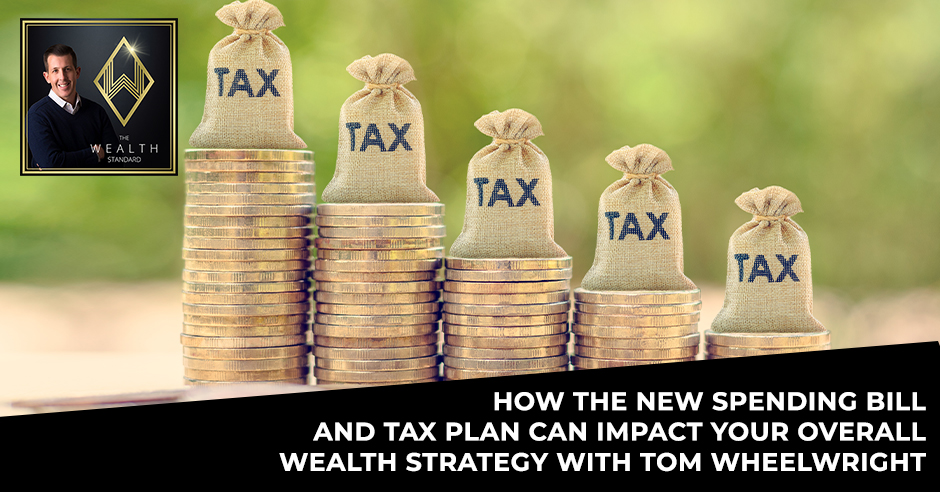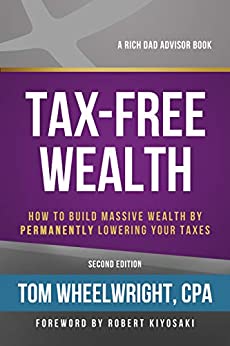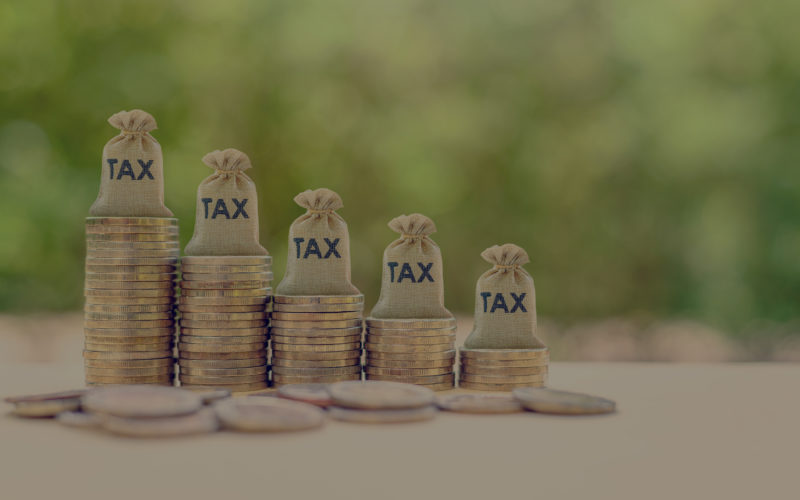How The New Spending Bill And Tax Plan Can Impact Your Overall Wealth Strategy With Tom Wheelwright
Podcast: Play in new window | Download

With the new president and administration coming in, a new spending bill has been passed. It tells an interesting story, but what exactly is its difference from the past spending bills? Patrick Donohoe brings back Tom Wheelwright to tackle this very subject. They also go into Biden’s tax plan and its implications to the overall economy. Tom is an entrepreneur, bestselling author, and the personal CPA of Robert Kiyosaki. He is studying the goings-on of the Biden administration when it comes to the spending plan that passed, as well as some precedents that are being set for future changes to the tax code that could potentially impact your overall wealth strategy.
—
Watch the episode here:
Listen to the podcast here:
How The New Spending Bill And Tax Plan Can Impact Your Overall Wealth Strategy With Tom Wheelwright
Thank you for reading another episode. Hopefully, you’re not just reading. You’re learning and getting some key insights into ways in which you can improve your wealth. I hope you’ve enjoyed the last couple of episodes, speaking about some current events. That’s what we’re going to do now with a good friend of mine, Tom Wheelwright. He is the personal CPA of Robert Kiyosaki and has been for years. He has been a great friend for years. I was intrigued based on some of the stuff he’s put on his YouTube channel and show. He is studying the goings-on of the Biden administration when it comes to the spending plan that passed, as well as some precedents that are being set for future changes to the tax code that could potentially impact your overall wealth strategy. It’s a great conversation. You guys are going to enjoy it. Make sure you check out Tom’s podcast. He has a CPA-facing show, as well as an investor and business-owner-facing show. He also has an awesome YouTube channel. Let’s get to my interview with Tom Wheelwright.
—
Tom, it’s good to have you. Thank you for coming back. What a couple of months we’ve had of 2021. It’s entertaining, isn’t it?
It’s almost like 2020 hasn’t ended yet.
It’s a continuation. It keeps going and going. We talked about what the stimulus meant with regards to the response to COVID. We’re with a new president and administration. We have this massive, I don’t know if massive is the right word. There’s probably some crazy word three levels above that that’s appropriate. You have this spending bill. I think it tells an interesting story. As you’ve been monitoring this, what are some of the things that you were curious about or found interesting as it related to how this spending bill might be different than past spending bills?

New Spending Bill: We’ve made unemployment non-taxable up to $10,000. We’ve made forgiveness of student loans non-taxable.
First of all, of course, it’s the timing because we’re on the way to recovery. We have only 6% unemployment, which historically is a very good unemployment rate. We have lots of businesses that can’t find people like restaurants. What we’re doing is we’re extending the increased unemployment. We’re sending checks when we have a historically high savings rate. We have not had as high savings rate since 1984. What are we doing? We’re giving more money. It’s very interesting both the obvious stuff like the $1,400 checks, which by the way, unlike the CARES Act, doesn’t just go to you and your spouse but also goes to your kids. It’s not a reduced amount for your kids. It’s the same amount for two kids.
We’ve got this Child Tax Credit and Child Care Credit. We’ve made unemployment non-taxable up to $10,000. We’ve made forgiveness of student loans non-taxable, which is interesting because it sets up the obvious question. The only reason you do that is because you’re expecting to forgive student loans. They’re not forgiving yet. You’re expecting this to happen. It’s clear that the Democrats are expecting President Biden to issue an executive order. It’s very interesting. For example, you have $350 billion going to states with the requirement that they can’t use it for tax cuts which is an interesting question because it begs the question, “Money is fungible.” Let’s say to use it for that other stuff, which frees up money for tax cuts, to make new other tax cuts. Even if they have a banner year, are they prohibited from giving any tax cuts?
There’s some clear unintended, maybe unintended. We don’t know but it is a massive spending bill. There’s a lot of stuff in there. Some of the spending is not going to happen until 2027 and you’re going, “How does this have anything to do with this crisis?” The reality is that most of it doesn’t but Joe Biden’s agenda. For example, eighteen months of COBRA, the insurance paid by the government. It’s tough to argue that. People need insurance when they’re unemployed. They don’t have money to pay for it. Having the government pay for their insurance for eighteen months, there’s certainly an argument for it. If you look historically, presidents are trying to make a big impact in their first 100 days. It’s interesting that this is the direction that they chose.
Earned income credit has long been thought of as a negative income tax. It's a social payment. Click To TweetGiven what he ran on, does it surprise you that this has come out?
Yes, and no. They had to get it passed to some conservative Democratic senators. Joe Manchin in West Virginia and Kyrsten Sinema of my own state, Arizona. To do that, there are certain things they could include and didn’t include. As much as the far-left complains about it, it’s a good inroad into Joe Biden’s agenda right off the bat. It’s not overly surprising, the $350 billion to the states. I don’t have mixed feelings about this bill. I don’t like the bill at all. I’m not particularly opposed to some of the things, but I am opposed to the price tag. The price tag is enormous and it’s going to come back to bite us.
What does this tell you about other agenda items that the Biden administration campaigned with?
Take for example, healthcare. He was a very big fan of universal healthcare. This makes inroads into that. He was a very big fan of unions. There was some stuff for unions. There’s an expectation that he was voted in by the Left Coast, the West Coast and the East Coast, so a lot of money are going to those states. There are expectations that a lot of that money will end up to bail out pension plans.
That was one of the provisions of the bill. It’s billing out the Pension Guaranty Association.
There’s a lot of bailout money in this bill. Let’s be honest, there was bail money in other bills too. The PPP loans are bailout money. They’re just bailout money for small businesses. The $300 a week unemployment is bailout money for unemployed people. One of the differences is that it’s not just the big businesses that are getting bailed out this time. In 2008, 2009 and 2010, it was only the big businesses. The small guys got hammered. One thing that you can say is that this is a bailout for pretty much everybody.
Going to where your specialty lies, you understand the tax code better than anyone I know. You have read some of the bills, especially during COVID. What do you think this means for changes to taxes in all respects, the business and investment side of things?
Most of these payments are tax payments. The $1,400, that’s a tax credit. The $3,600 for kids, that’s going to be paid out ahead of time $300 a month, but that’s a tax credit. Dependent Care, that’s a tax credit. The forgiveness of student loans, that’s a tax exemption for that. The unemployment not being taxable, that’s taxed. You see that all of this policy, most of it, with the exception of the actual handouts of the $350 billion to the states and $300, there’s that but a lot of it is taxing. We’re seeing social manipulation through the Tax Law, which we’ve always had. Let’s face it. I’ve always said that the Tax Law is a series of incentives. What we’re seeing is a shift in where those incentives are going. They’re going towards families. Another thing, you no longer have to have children to get the Earned Income Credit. That’s new.

New Spending Bill: By definition, a company is valued-based on its PE ratio. If their earnings go down because you’ve got higher taxes, your price comes down with it.
They’re doing it for 65 and older too, right?
Right. Earned Income Credit has long been thought of as a negative income tax. That was first proposed by Milton Friedman, the conservative economist back in the ’70s. It’s a social payment. The Child Tax Credits are social payments because they’re refundable now. That is also new that they’re refundable. What you have already seen is, through the Tax Law, a redistribution of income. What will happen next is that they will use the deficits they’ve created to justify tax increases on the “wealthy.” They defined it at $400,000. Interestingly enough, Joe Biden is going to stick with that $400,000 threshold. That’s very important for everybody who’s reading.
As soon as I heard him say that in his campaign, I’m going, “That’s my target. I don’t want any clients making more than $400,000 of taxable income.” You can make millions and millions of dollars but don’t make more than $400,000 of taxable income. We’re already seeing in the dependent care credit that the threshold is $400,000. That’s a good indication that that’s where we’re going. This is a shift of benefits to lower-income, lower-middle-class. Not even middle-class, but lower-class because all of the stuff is refundable. It’s not just offsetting taxes. It’s a payment that’s a direct payment.
You can think of the child credit as a universal basic income for children. That’s what it is. They already are talking about making that one permanent. The Democrats have been very smart about this. They can make this shift for taxes using the reconciliation process. They only need right there 50 plus 1 majority in the Senate. They don’t need 60 votes in the Senate for this. The other thing they’ve been smart about is, rather than giving a universal basic income to adults, which gets a lot of pushback, they gave basic a universal income for kids. How do you argue with that? From a purely political standpoint, I have to applaud them.
There are probably some fundamental differences between what Biden has proposed and what he campaigned with as far as what’s going to happen with taxes. What happened in 2017 with Donald Trump in what he proposed? What are those 30,000-foot fundamental differences?
It’s just to get incentives. That’s all it is. They are still incentives. For example, Biden wants to increase the top tax rate back to 39.6%. I would guess that will happen. It’s hard to fight that one. That’s a tough argument that people that make that much money of $600,000 married need a tax break. They don’t. It’s not going to affect the economy if they raise those taxes. That’s a small shift. I don’t think that’s a big deal. He wants to tax capital gains over $1 million at a much higher rate. That will be an interesting one because as long as he exempts businesses and real estate, then that one could easily fly. That’s an easy one to exempt for personal residences. There are a few things they’re going to have to exempt in that one, but that will apply.
A lot of the other tax increases are much tougher. Joe Manchin does not like the change in the estate tax. He voted to get rid of it completely. There are uphill battles for Biden in his bigger agenda, but they’re making inroads. To President Biden’s credit and the Democrats, they’re being very careful. They gave up the $400 unemployment and cut it back to $300, but then they extended them. There were trade-offs here. They’ve been smart about what they’re doing. All we’re doing in 2017, we had big tax incentives for businesses and real estate. There are going to be social payments like we see in this bill, but there are also going to be a lot of incentives for clean energy. The next big thing is clean energy. That’s where the tax incentives are going to be. My clients are already talking about shifting their strategy from residential real estate to real estate associated with clean energy. It’s not that hard to do. It’s just a matter of understanding the law and taking advantage of the incentives that are there.
Who owns Corporate America? It's not mostly big stockholders. It's mostly pension plans and 401(k)s. Click To TweetDo you think this is something that’s going to get pushed this 2021? Do you think it will go into 2022?
It will be this 2021. They have one more shot at reconciliation this 2021. It’s very tough for them to make changes like this in an election year. I would expect this 2021 that we’re going to see any changes that they make, they’re going to try to push this through while the iron is hot.
They have two years until midterm. It’s like they’re trying to get everything, all the major items, those big rocks through.
Let’s face it. Both parties do this. It’s not like this is, “The Democrats are horrible. The Republicans they’re saint.” The Republicans did exactly the same thing. The Republicans didn’t care anymore about the deficit that the Democrats do. You can’t even take that argument. There are very few people in Congress that are looking at deficits at all these days. To me, it’s politics as usual.
Tom, as we look at the economy, we’re not economists. Sometimes we talk about it. Of course, it’s opinion. Looking at some of the studies that have been done by Tax Foundation, where they analyzed if Biden’s tax plan went through, the implications to the overall economy were negative in all categories, not hugely negative, but 500,000 jobs lost. GDP is a negative one and a half-ish. When you look at the objective of Democrats, that side of things, the administration, it’s not necessarily pushing lots of growth. It’s pushing growth in certain areas.
It’s very much shifting incentives. There’s going to be more going to unions. President Biden has been very clear that he wants to expand union activities. There’s a provision in this COVID bill that gives sixteen weeks of COVID leave to federal employees. You’re going to continue to see that same thing continue to happen. One thing that was interesting in the Tax Foundation’s findings is that they estimate that the worst thing he could do is to raise the corporate tax rate. That was surprising to me. I’ve always thought 25% is not a horrible corporate tax rate. I thought that’s probably where it should have gone in the first place. That was one of the original proposals in 2017 that was taking the 25%.
For it to go to 25%, the challenge is you can’t go much higher. Remember, we don’t just have a federal income tax. We have a state income tax. You’ve got to add on 5%, 6%, 7% to that. Now, you’re in the 25% federal, you’re in the 30% plus range, which puts you equal to other countries. We’re lower than other countries, but if you raise it to 25%, you put us equal to other countries. If you go over 25% to 28%, the 28% that he campaigned on, we’re higher than other countries. That would be devastating to us. The other thing that I don’t know that is ever considered in the public discussion is, “Who owns Corporate America?” It’s not mostly big stockholders. It’s mostly pension plans and 401(k)s. As the stock market increases, that benefits pension plans and 401(k)s. Corporate income tax is a tax on pensions and 401(k)s.

Tax-Free Wealth: How to Build Massive Wealth by Permanently Lowering Your Taxes
The theory is that those values will go down just because profits are going to go down because of taxes.
By definition, a company is valued-based on its PE ratio. If their earnings go down because you’ve got higher taxes, your price comes down with it. That Price-to-Earnings ratio is you’ve got to look at the earnings to determine what the price is. That’s a tough one. When you’ve got an economy that you’re trying to stimulate to put big taxes this 2021, I suspect the corporate income taxes, they’re probably going to push these social payments. There are a couple of states in play for the Democrats in the Senate in 2022. Notably, Wisconsin and Ohio. There are a couple in play for the Republicans too. Notably, Arizona and Nevada. The Democrats think they can pick up seats if they do their legislation and follow the legislation appropriately. This is all towards gaining more control. What they like is a little more control so that they can pass more of their agenda.
Tom, this has been super helpful. I know that as we get closer to when certain legislation is going to happen when it comes to taxes, let’s chat again to talk about the specifics of it. Entrepreneurs and investors are always looking for opportunities. They’re trying to think where the puck is headed. It’s clear based on some of the things that you said, where the economy is going, where investment is going and where you can put money to pay less taxes but still get good gains. It’s going to be cool to see what are the strategies available once we know what’s coming down the line. Let’s circle back in a few months.
Yes, for sure. I don’t read some of the bills, Patrick. I read them all.
Heaven bless you, Tom.
It’s so much. These bills are fascinating. What’s in them is remarkable. The good news is they’re not going to get rid of incentives. They’re just going to change where the incentives are. Entrepreneurs can always get to tax-free wealth. We can always get there. We have to have good advisors, understand the law and have a good strategy for investing so that if we make the right choices, then we can pay less tax. We need to stay on top of it all the time.
Tom, you also have an awesome podcast. First, a podcast that is tax professional-facing, but also a podcast for the public where you teach a lot of these principles. Tom also has an incredible practice where he consults individuals just like you and businesses to navigate the waters of a complex system of sorts. Everything Tom-wise, you can go to WealthAbility.com, unless you want to cite some other things that you’re working on.
Entrepreneurs can always get tax-free wealth. They have to have a good strategy for investing to make the right choices and pay less tax. Click To TweetTax-Free Wealth is the book that explains how the Tax Law works.
Are you going to do version three when the new stuff comes out?
I’m writing a new book that will come out at the end of 2021. I’m very excited about the new book. It’s a very in-depth look at some investments and the tax consequences of those investments. It’s very exciting stuff. Like you said, we have an entire network of tax advisors around the country and in Canada. In 2022, we’ll be launching internationally. WealthAbility.com is the place to go. Anything we can do to help, we’re happy to help any way we can.
Tom, as always, it’s a pleasure. Thank you for imparting your wisdom to us. We appreciate it. Like I said, we’ll circle back once we get closer to what’s going on with some of the things that are going to change in the tax code.
Thanks, Patrick.
I’ll see you, Tom.
Important Links:
- Tom Wheelwright
- YouTube – Tom Wheelwright
- Podcast – The WealthAbility Show
- WealthAbility.com
- Tax-Free Wealth
About Tom Wheelwright
 Tom Wheelwright, CPA is the visionary and best selling author behind multiple companies that specializing in wealth and tax strategy. Tom is also a leading expert and published author on partnerships and corporation tax strategies, a well-known platform speaker and a wealth education innovator.
Tom Wheelwright, CPA is the visionary and best selling author behind multiple companies that specializing in wealth and tax strategy. Tom is also a leading expert and published author on partnerships and corporation tax strategies, a well-known platform speaker and a wealth education innovator.
Love the show? Subscribe, rate, review, and share!
















